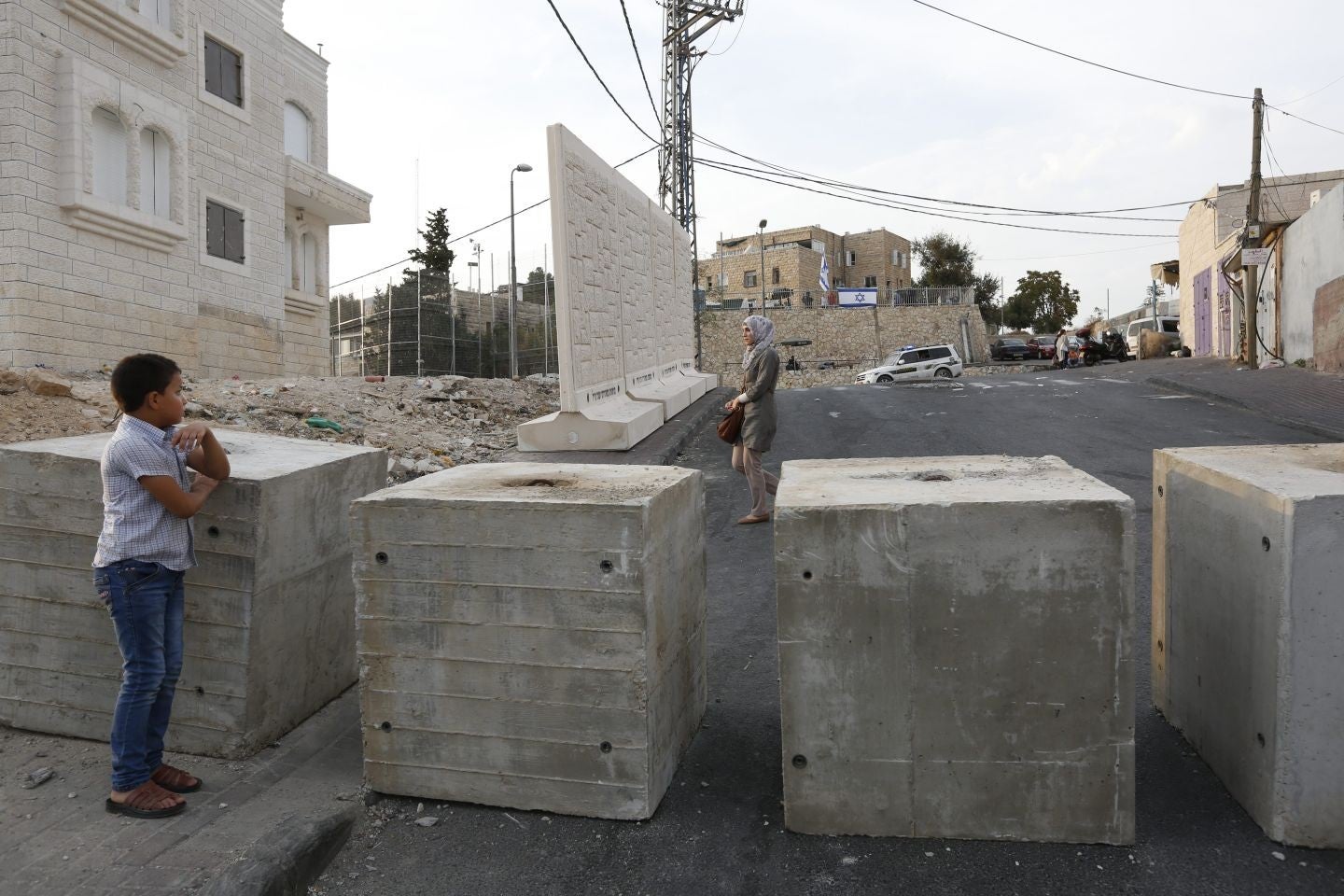Israeli doves say months of attacks in Jerusalem caused by neglect of Arab areas
'A lot of what's happening is frustration... the frustration of people who see huge gaps between west and east Jerusalem'

It is morning break at the Jabel Mukaber Secondary School for Boys in Israeli-occupied East Jerusalem. But the schoolyard is narrow and cramped. No one is playing sports -there is no space for that.
Step inside the converted residential building and things get worse - it's cold because there is no heating. It's dark in the classrooms-some of the lights are broken and the municipality has been in no rush to fix them, according to educators. One classroom seen by the Independent on Sunday is no more than three metres wide with rows of four students crammed into that space.
''This building is not qualified to be a school. It's as if you are entering a cave,'' says one teacher, who, like all his colleagues declined to be identified out of fear he would lose his job. ''This depresses people. It's like a prison. We are sitting in a prison. There is no exercise, no sport, the general condition is chaos.''
''There is no equipment to teach correctly. I need a projector to show students examples and to illustrate ideas but there is not one projector for this school,'' he continued. Nor are there any computers, science labs or a library, basic features of the schools nearby in Jewish West Jerusalem”.
''I can't blame the students if they don't want to learn,'' says another teacher, who asked to be identified by the initials T.A. “If this was a Jewish school I could tell the kids go and research topics. Here there is no library. The [attainment] level is low. Many will fail and go into construction or work in restaurants.''
The Jabel Mukaber school is one of many in the East Jerusalem area illegally annexed by Israel in 1967 that meet in converted apartment buildings rather than structures designed as schoolhouses due to a long standing pattern of neglect in education and other services towards the Arabs who make up one third of the population of the city. While Mayor Nir Barkat's office says he has been improving conditions in recent years Palestinians say nothing has really changed and in some neighbourhoods things have even gotten worse.
Nahar Halaseh, an activist on the local parents committee, said residents have complained for years about the high school and pleaded for a new one to the municipality and other government bodies but nothing has been done. “We pay municipal taxes,” he says. ''They are taking our taxes and giving us nothing. “ He called the policy “racist”.
Last week Israeli President Reuven Rivlin bluntly admitted Israel has ''abandoned'' the welfare of East Jerusalem residents and he sharply criticized authorities for not providing services.
''Does anyone think that dealing with the sewage, roads, schools and medical centres of east Jerusalem can or should wait until the end of the conflict?” he asked in an oped for the Washington Post.
Amid a two and a half month old wave of unrest that has shaken Jerusalem along with the West Bank, dovish Israelis are linking the discrimination in services to East Jerusalem to the Palestinian violence.
''A lot of what's happening is frustration from social and economic neglect,'' says Laura Wharton, a city councillor from the Meretz party. ''There's a lot of incitement and religious aspects that extremists are trying to bring in but tensions are in part frustration over the difficult socio-economic situation and frustration of people who see huge gaps between west and east Jerusalem,'' she says.
One, pupil said he dreams of studying in Germany to become an electrical engineer. But that will never happen. ''It's hard to learn here,'' he says. ''It's crowded and one student can stop the lesson.''
In 2011, in response to a petition filed by the Association for Citizens Rights in Israel against overcrowding, the supreme court ordered the municipality to create 1000 classrooms in East Jerusalem during the next five years. Now, with that period almost expired, the city has not reached even half that number, according to Ms Wharton, the city councillor.
East Jerusalem also faces discrimination in child care, with 25 centres in Jewish neighbourhoods compared to five in Arab ones, she says. In some Arab neighbourhoods there is no proper rubbish removal and in one no removal at all, she adds. In construction, the municipality rarely approves permits for East Jerusalem residents to build houses, forcing them to build illegally and risk demolition.
The municipality did not respond to questions about conditions at the Jabel Mukaber school. It did say in a written response that Mr Barkat, the mayor, ''is leading in recent years a reduction of the gaps in Arab neighbourhoods in all aspects of life after forty years of neglect by Israeli governments.'' As part of this, the municipality is ''investing amounts unprecedented in their budget and breadth”.
However, Ismail Srour, a Jabel Mukaber community leader, is unimpressed by such talk: ''I don't see any progress or advancement,'' he says. ''The Israeli president's statement is correct. But to say something is not enough... We need big changes and not cosmetic solutions…. We should receive the same services that Jews receive for their neighbourhoods.''
Subscribe to Independent Premium to bookmark this article
Want to bookmark your favourite articles and stories to read or reference later? Start your Independent Premium subscription today.

Join our commenting forum
Join thought-provoking conversations, follow other Independent readers and see their replies